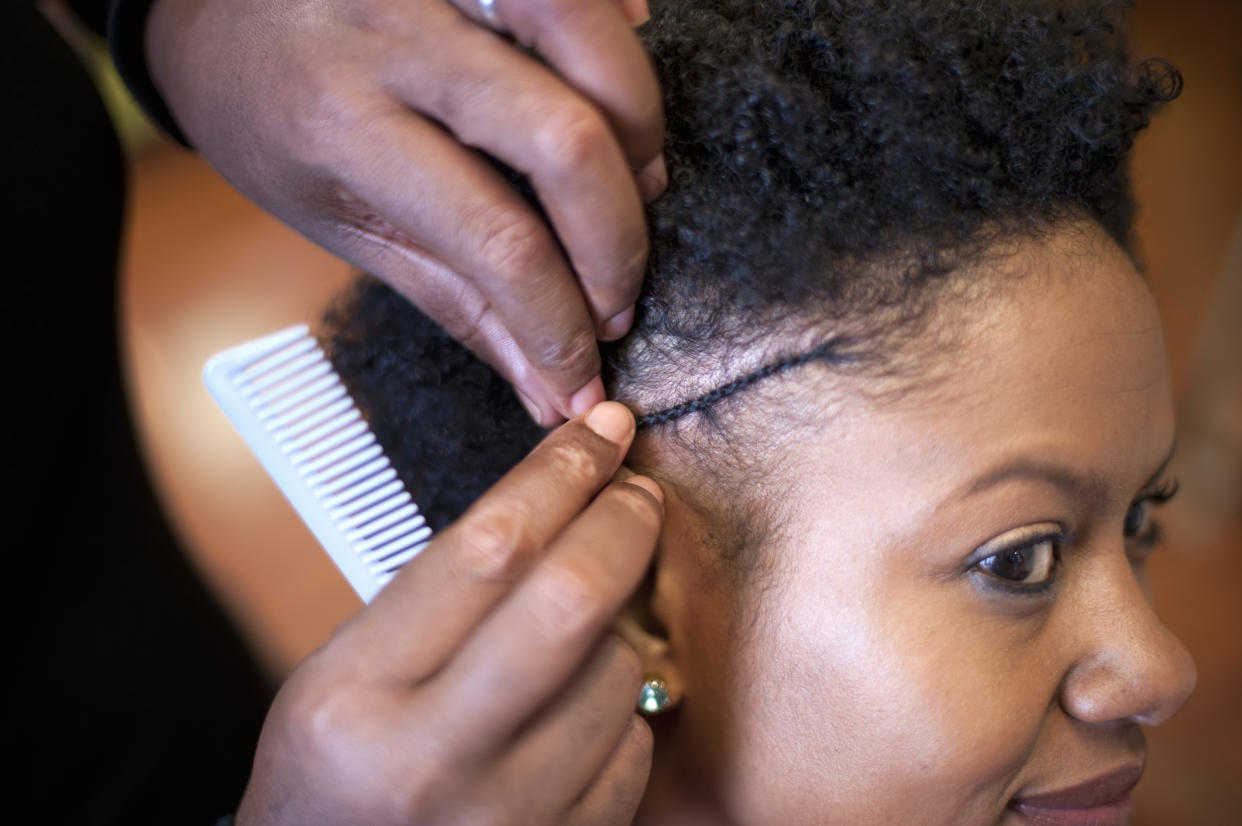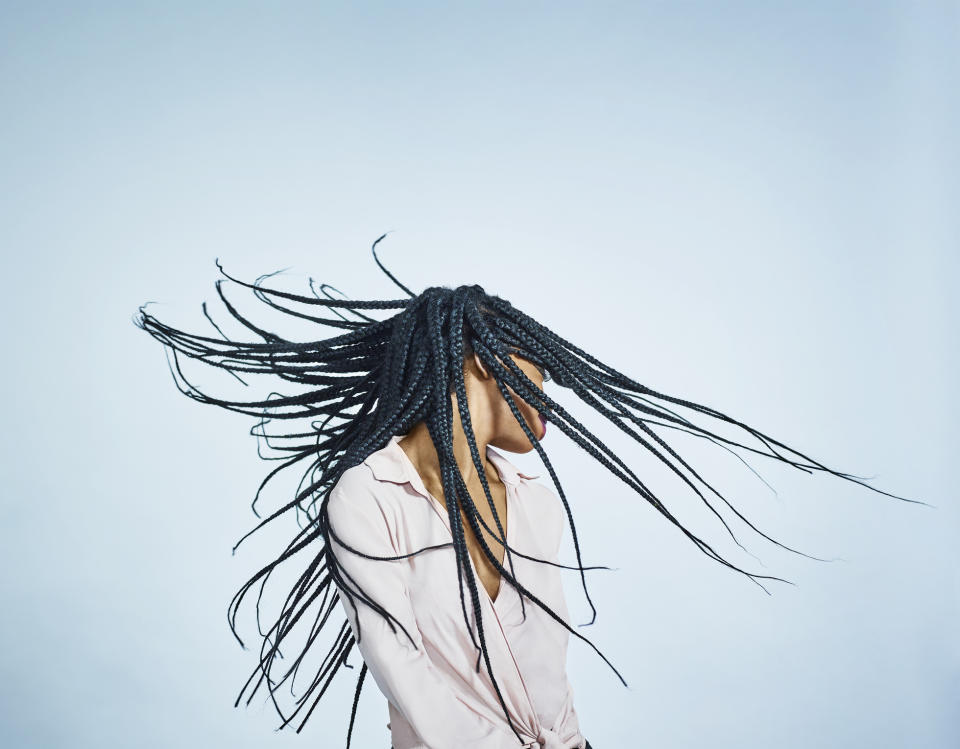New Jersey could be the next state to lift regulations for hair braiders

While most braiders would love to dive deeply into the business of braiding, in many states, there are barriers that keep them from legally operating a salon. One of those states is New Jersey. However, a few of its legislators are pushing a new bill that would relax state regulations and allow new braiding businesses to thrive.
According to NJ Spotlight, if you want to braid Afro-textured hair in New Jersey, you have to spend the equivalent of 50 days in cosmetology school. One of the main reasons this requirement has raised concerns is that most beauty schools don’t teach hair braiding in their curriculum. A new bill, A3754, sponsored by legislators Angela McKnight, Shanique Speight, and Arthur Barclay would exempt hair braiders from this law.
“I have started pushing for this change this year because it was brought to my attention,” McKnight tells Yahoo Lifestyle. “This is an important change, and the No. 1 reason is that the current cosmetology school does not teach people how to braid hair, but they currently must go to schools where they have to pay as much as $17,000 and spend roughly 1,200 hours for something that does not reflect what they will be professionally doing.”
Speight adds, “Prior to this, I had no idea about how tough it was for these women to practice what they love doing. These women should have the right to support their families without these kinds of restrictions.”

But why are the laws so restrictive for hair braiders? One thought is that the laws are very dated and may be out of touch with current hair practices. Paul Avelar, senior attorney at the Institute for Justice, who has led the organization’s Braiding Freedom Initiative for the past four years, explained to Yahoo Lifestyle: “In most states, the laws governing hair-related services were written between the 1930s through 1950s, and no one had ever thought about this issue. That meant that braiders got lumped into regulations meant for barbers or cosmetologists, two occupations that are different than braiding.”
Speight adds, “Because hair is involved, hair braiding has traditionally been classified under cosmetology, because people outside of the culture know little about it. To prevent any potential harm to the public, the rules and regulations that apply to other cosmetology services have also applied to hair braiding.”
One licensed hairstylist and salon owner, Barri Gibson of Red. by Rubyredroots salon in South Orange, N.J., supports a handful of local braiders and isn’t opposed to the idea of hair braiders being required to have formal training and licensing. She stresses the importance of understanding funguses, how to properly disinfect hair, and scalp conditions, even if chemical services aren’t being done. “Tons of women suffer from traction alopecia as a result of braids,” she tells Yahoo Lifestyle. “As a stylist who takes pride in helping clients maintain healthy hair and scalps, I think it’s important for hair braiders to do the same. Many braiding salons don’t have sinks to wash clients’ hair, which means they are servicing unclean hair and scalps.”
Shauna Wright, another licensed New Jersey hairstylist and owner of ShaunieDoesMyHair, shared her past experience working at a hair braiding salon for several years with Yahoo Lifestyle and mentioned how willing she was to step in as manager because the salon owner, who wasn’t licensed, faced the threat of being shut down. “The actual owner, Sue, who I have grown to love, opened a hair braiding studio when she moved to New Jersey from Africa,” Wright says. “In her country, women were not allowed to learn to read and write and were taught to take on more domesticated duties while learning to rely solely on their husbands. Social gatherings among women would include braiding each other’s hair. This hobby soon turned into a passion of hers, and when her family relocated to America for a better life, she decided to home in on her passion. She had money to open an actual storefront, but she didn’t know all of the regulations that would soon come with it. Because she cannot read or write, getting this license or even holding any other job, for that matter, seemed nearly impossible. I couldn’t watch her amazing business get shut down and risk her no longer being able to provide for her family, so I became the salon manager, which allowed the storefront to stay open.”
In the video posted above by NJSpotlightTV, one Senegalese immigrant and hair braider in Trenton, Khady Tima Cisse, opens up about how braiding helps her earns a living so she can help take care of her family. She also says she simply loves doing it. “It’s a part of my culture,” she says.
The video also highlights another hair braider, Hortense Fassu, who has been fined more than $1,000 for operating without a cosmetology license, and the struggles she’s faced while trying to conduct a business based on talents she learned in her home country, Cameroon.
In their efforts to lift laws that hamper hair braiders, McKnight and Speight haven’t faced much pushback to date. “The bill passed in our committee, Women and Children, and we look forward to it passing in both houses in a few weeks,” says Speight. “There doesn’t seem to be any opposition to the changes we are trying to make. One of the biggest factors is our ability to convey how safe this practice is to help people understand that formal training and licensing are unnecessary when it comes to hair braiding.”
In 2016, after the Institute for Justice filed a lawsuit, Iowa relaxed regulations for hair braiders, and shortly before that, Kentucky rescinded laws requiring hair braiders to be licensed. If this new bill in New Jersey wins approval, it will be a huge win for many immigrants, more specifically women of color, who want to make a better living in America. It would also make New Jersey the 24th state that doesn’t require braiders to have a license if they want to work in a salon.
“Allowing unlicensed hair braiders — many of whom are already working, albeit unwittingly illegally — to open salons will free them to expand their businesses and empower consumers to make their own choices,” says Avelar. “Freeing braiders from onerous and unnecessary regulatory burdens will respect braiders’ right to earn an honest living and allow them to support themselves and their families through the practice of their cultural and traditional craft.”
Read more from Yahoo Lifestyle:
‘Dear beautiful brown girl’: This empowering film is a love letter to black women and their hair
Lupita Nyong’o cuts her own braids, and the internet is freaking out
Follow us on Instagram, Facebook, and Twitter for nonstop inspiration delivered fresh to your feed, every day.
